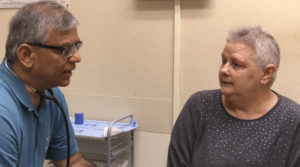Tough Talk: HEDIS Encourages Life and Death Discussion
January 3, 2018 · Emily Schmidt
Dr. Kashyap Patel says if there’s one thing that his patients in Rock Hill, South Carolina and Lancaster, South Carolina have in common, it’s that they appreciate plain talk. Even when it’s tough talk. So, when a new patient enters Carolina Blood and Cancer Care, Dr. Patel talks life—and then he talks death.
Death.
Dying.
Dr. Patel admits those are not words which make people comfortable. Yet he says there is everything to be gained from helping people understand and talk about their end of life preferences.
He points to the story of a patient he had treated for four decades. Mary (not her real name) had Stage 4 cancer and was responding well to cancer treatment, but he could see it was taking a toll on her quality of life. He asked, “Have you thought about what you would do if you were not here a week from now?” Mary answered, “Hallelujah, Dr. Patel! I wanted to talk

Carolina Blood & Cancer Care includes some tough talk in the patient-centered routine.
about this but I didn’t want to disappoint you.” She had feared she would let down her long-time physician if she opted to end treatment. Mary asked for a meeting with Dr. Patel and her family, and in that meeting, expressed her desire to transition to hospice care. Mary’s comfort came from finally feeling free to have a conversation about her wishes.
Five Wishes
Those conversations are prompted by a program called “Five Wishes” which the practice makes available to every patient who wants it. Five Wishes is a legal document written in everyday language to help people outline their advance care wishes without engaging an attorney. It’s legal in most states, including South Carolina. Dr. Patel says last year, he offered Five Wishes to all his patients and none objected to the talk of advance directives. 98 of his practice patients opted to record their wishes to guide medical treatment in the future.

Dr. Patel discusses the care plan with a patient.
The practice makes it easy—offering the document for free and even training office employees at both locations to legally notarize the document. Patients can lose the financial and legal anxiety of pursuing advance directives on their own. Dr. Patel can spend less time translating legal jargon into medical options, and focus more time on his patients’ healthcare.
HEDIS Encourages Tough Talk
Dr. Patel says the NCQA HEDIS© Care for Older Adults reporting elements about advance care planning make sense—and can help physicians better understand their patients. As he says, we invest countless time and money into helping babies enter the world, but we too rarely prepare for people leaving the world. Conversations about potentially difficult health care decisions may never be easy, yet Dr. Patel believes they will always be necessary. His goal is to make the conversation as easy as possible for patients searching for the right words to live by—on their terms.








